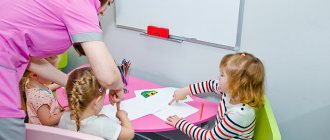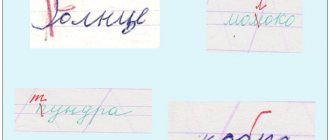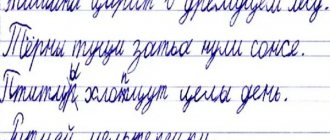What is dysgraphia
Dysgraphia in children - the presence of systematic, identical errors in written speech
due to impaired brain activity.
Don't panic if your child accidentally mixes up several letters in his homework. But if such slips occur regularly, perhaps this is no longer inattention, but a serious illness.
Primary schoolchildren are diagnosed with dysgraphia for the first time
. Even if four- or five-year-olds make mistakes, this is considered absolutely normal.
Diagnostics
Symptoms of dysgraphia are subject to diagnosis by speech therapists. However, observant mothers discover important manifestations on their own. This:
- Excitability
- Easy fatigue
- Hyperactivity
- Mood swings
- Neurological problems
- Dyslexia
- Weak hearing
- Weak attention
- Closedness
Experts use tests to diagnose dysgraphia in schoolchildren. Download and test at home:
Written tests for dysgraphia research
Causes
The etiology of dysgraphia is associated with a whole range of factors.
During the antenatal period:
- Toxicoses, mainly in the final trimester
- Rh conflict in case of fetal injury
- Alcohol, nicotine, drug addiction of the mother
- Intrauterine infection
- Severe stress
- Overdose of medications not intended for pregnant women
- Chemical intoxication.
Postnatal causes of dysgraphia (this also includes dysgraphia in adults):
- Rickets
- Viral infections (chickenpox, jaundice, meningitis, encephalitis, influenza)
- Hypoxia and asphyxia during childbirth
- Concussions, traumatic brain injuries
- Long-term debilitating illnesses
- Muteness or speech disorders in parents
- Bilingual environment
- Social isolation
- Overstrain of the nervous system
- Excessively early training, not supported by the appropriate psychological state of the child.
Correction
Treatment of dysgraphia in younger schoolchildren occurs with the help of exercises. Correction occurs both by professionals with speech therapy knowledge and by the family. Mothers, following the recommendations of speech therapists, can conduct additional mini-lessons on their own. It is important to follow the rules.
- Exercise regularly
- Don't scold your child if he doesn't succeed
- Try to diversify activities, conduct them in a playful way
- Take breaks when tired
Classes should be a pleasant pastime, and not a punishment for wrongdoing. If the baby enjoys what is happening, progress will come much faster.





